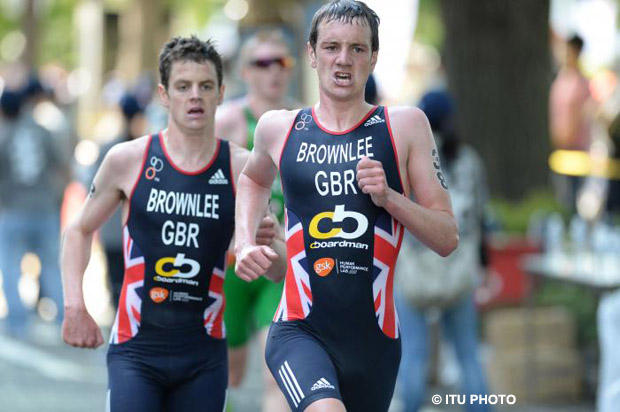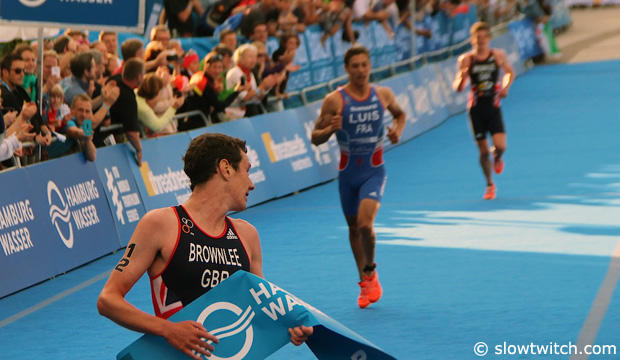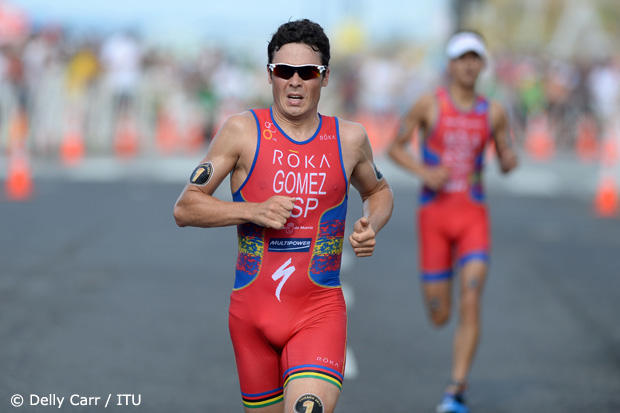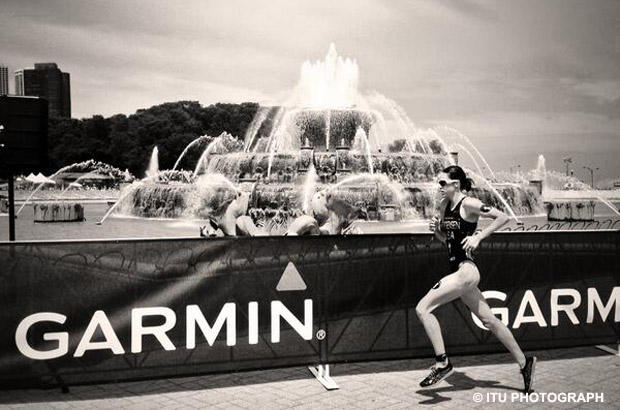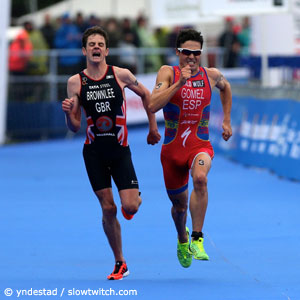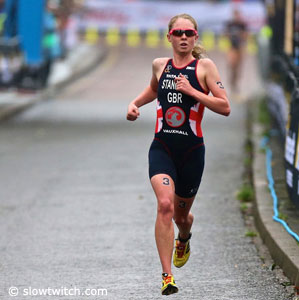Edmonton by the numbers
Going into the World Triathlon Series Grand Final in Edmonton this weekend, it is clear that Gwen Jorgensen of the U.S. is an overwhelming favorite to wrap up the season long WTS World Championship Series women’s points title. Men’s WTS points leader Javier Gomez of Spain should win but he is within reasonable reach of his rivals.
We all know what is likely to happen as Jorgensen has dominated this year with a record four straight WTS wins (Yokohama, London, Chicago Hamburg) and her fifth-best WTS result was 3rd at Cape Town. Her near-perfect 5-event points total is 3,885, giving her a virtually insurmountable 848 points lead on current WTS points runner-up and fellow U.S. star Sarah Groff.
Gomez was almost as good, scoring three wins in a row at Auckland, Cape Town and Yokohama, then one more at Chicago, with his final points eligible finish a 4th at Hamburg. That gives him a 3,833 point total, but much less of a lead thanks to much firmer opposition trying to stop Gomez from a record-tying 4th ITU World Championship.

Jonathan Brownlee, the 2012 WTS World Champion, is just 282 points behind after posting a win at Stockholm, and scoring runner-up finishes at Auckland and Cape Town, 3rd at Hamburg and 5th place finishes at Yokohama and London. Also not out of reach is Mario Mola of Spain (-342 points) and, theoretically at least, Joao Pereira of Portugal (-895) and Richard Murray of South Africa (-922).
With 50 percent more points at stake at the WTS Grand Final this weekend (1200 for the win versus 800 for a regular WTS victory) it will be important to Jorgensen and Gomez to be aware of where they stand if trouble arises.
Anything can happen, but probably won’t
While no one we know is rooting for disaster, Gwen Jorgensen has proven that anything can happen. A year ago going into the Grand Final, Jorgensen had 3 WTS wins for the season and led the points chase by 8 over Anne Haug and 13 over Non Stanford. Sadly, Jorgensen crashed hard on the bike, could not finish and dropped from 1st to 4th in the final WTS World championship standings won by Non Stanford of Great Britain. At the 2012 Olympics, Jorgensen was a co-favorite after placing 2nd at the 2011 Olympic dress rehearsal event in London but fell to 38th on the big day after a mechanical issues struck on the bike leg. And this year at WTS Auckland, after a troubled swim, transition and chase pack bike leg, she could only rise to 12th after a race-best run.
While Gomez has been dominating, he proved he was human with a 6th at London and a DNF at Stockholm.
While listing all permutations would be too long for this article, here is a list of potential factors and how they might affect the World Championship aspirations of Jorgensen and Gomez:

Women
If Jorgensen places 16th in the field of 65, she wins the title even if current runner-up Sarah Groff wins. If Jodie Stimpson, now third, wins, Jorgensen has to finish 18th or better. If Helen Jenkins, now 4th, wins, Jorgensen has to finish 22nd or better.
If by some dark twist of fate Jorgensen DNFs, Groff must finish well and will have a tougher time holding off her nearest rivals. If Jorgensen is out and 3rd place Jodie Stimpson wins, Groff will lose the title even if she finishes second at Edmonton. If Jorgensen is out and Stimpson has an off day and two-time ITU World Champion Helen Jenkins wins, Groff must place 2nd in order to win the title. If Jorgensen is out, Stimpson and Jenkins are behind, and Andrea Hewitt wins, Groff must finish 4th or better to win the title.
Men
Despite finishing just one place and a few points back of Jorgensen’s stellar WTS record, Gomez cannot afford to have a really off day. If Gomez finishes 4th or better, he wins the title even if current runner-up Jonny Brownlee wins the race. If Gomez DNFs, Brownlee can surpass him with a 19th place finish or better. But winning the title will also depend on how he does against other rivals — outlined below.
If Mario Mola of Spain wins, Gomez needs to finish 5th or better to stay ahead. If Gomez DNFs, Mola needs to finish 17th or better to top him.
If Gomez DNFs, Joao Pereira of Portugal must 5th or better to surpass him. If Pereira wins, Gomez must finish 18th or better to keep him at bay.
If Richard Murray of South Africa wins, Gomez must finish 19th or better to stay ahead. If Gomez DNFs, Murray must finish 4th or better to pass him.
If Alistair Brownlee wins and brother Jonny, Mola, Pereira and Murray are out of contention, Gomez must finish 25th or better to win the title.

Where Jorgensen stands in ITU history
If she prevails, Jorgensen would be the 4th U.S., woman to win an ITU Olympic distance Women's World Title, following Karen Smyers (1990, 1995), Siri Lindley (2001) and Sheila Taormina (2004). The U.S. Women would have a total of 5 World Titles, putting their country a distant second behind Australia with 13 gold medals (Emma Snowsill (3), Michellie Jones, Emma Moffatt and Emma Carney (each has 2), and Jackie Gallagher, Joanne King, Loretta Harrop and Nicole Hackett with one apiece. The U.S. women would then be one ahead of Great Britain with 4 golds – Leanda Cave (2002), Helen Jenkins (2008 and 2012) and Non Stanford (2013).
During this season, Jorgensen’s four straight WTS wins broke Paula Findlay’s record string of three WTS wins in a row set in 2011. Combined with her three WTS wins in 2013, Jorgensen now leads in the women’s career WTS wins category with 7, now two ahead of Paula Findlay’s career total of 5 WTS victories.
Jorgensen has earned the reputation as the fastest woman runner in ITU Olympic distance history – although supporters of Emma Snowsill would fiercely dispute. But there is no disputing Jorgensen’s domination of the run this year. Jorgensen’s highlights include a 32:46 10k split at Cape Town, 1:24 better than the next best split by Anne Haug. She also posted women’s race-best 10k run splits at Auckland (34:16 – 1:03 better than next best), at Yokohama (33:46 – 39 seconds better than the next best split), in Chicago (34:14 – 1:24 better than Helen Jenkins). Her 5k sprint runs also led the pack in London (16:10 –7 seconds better than Emma Jackson) and in Hamburg (15:46 – 9 seconds better than Emma Jackson).
If Jorgensen wins and Groff holds on with a 2nd place World Championship finish, that would be the first ITU World Championship 1-2 finish in U.S. women’s history. If Jorgensen wins the WTS series title and Groff finishes with a bronze medal, that would be the 5th time in U.S. women's history, following Karen Smyers-Joy Hansen in 1990, Karen Smyers-Joy Leutner in 1995, Siri Lindley-Joanna Zeiger in 2001, and Sheila Taormina-Laura Bennett in 2004.
Javier Gomez’s place in ITU history
If Javier Gomez wins the WTS World Championship men’s season points title, that would break his tie with Peter Robertson of Australia (2001, 2003, 2005) and give the remarkable Spaniard
four ITU Men’s Olympic distance World Championships (2008, 2010, 2013 and 2014) and tie him with long- time leader Simon Lessing of Great Britain (1992, 1995, 1996 and 1998).
Potential dough
If Javier Gomez wins the Grand Final ($30,000) and takes the WTS season points championship bonus pool ($80,000), plus his WTS results (Auckland $18,000), Cape Town ($18,000) , Yokohama $20,000) London ($4,100), Chicago ($18,000) and Hamburg ($6,000), his potential WTS take for the year will be $194,100.
If Gwen Jorgensen can win the Grand Final ($30,000) and the WTS season long bonus pool ($80,000) in addition to her individual WTS results at Auckland ($1,400), Cape Town ($8,000) Yokohama ($20,000), London ($18,000), Chicago ($18,000), and Hamburg ($18,000), her potential total WTS take for 2014 could be $193,400.




